Report: Health and Social-Political Dimensions in Aged Care
VerifiedAdded on 2022/09/16
|7
|1722
|13
Report
AI Summary
This report delves into the multifaceted aspects of aged care, examining the role of community-based services in supporting the elderly and their potential drawbacks. It explores the implementation and importance of a people-centered model for health delivery, emphasizing patient autonomy and the coordination of care. The report also discusses the financial aspects of aged care, including the Australian government's funding mechanisms, co-payment models, and the ethical considerations surrounding these financial arrangements, such as the potential for health inequalities and the impact on patient well-being. Furthermore, the report highlights the barriers to establishing patient-centered care and the political issues surrounding the funding and provision of aged care services, providing a comprehensive overview of the key issues in this critical sector.

Running head: Health and social-political in aged care
Health and social-political in aged care
Name of the Student
Name of the university
Author’s note
Health and social-political in aged care
Name of the Student
Name of the university
Author’s note
Paraphrase This Document
Need a fresh take? Get an instant paraphrase of this document with our AI Paraphraser
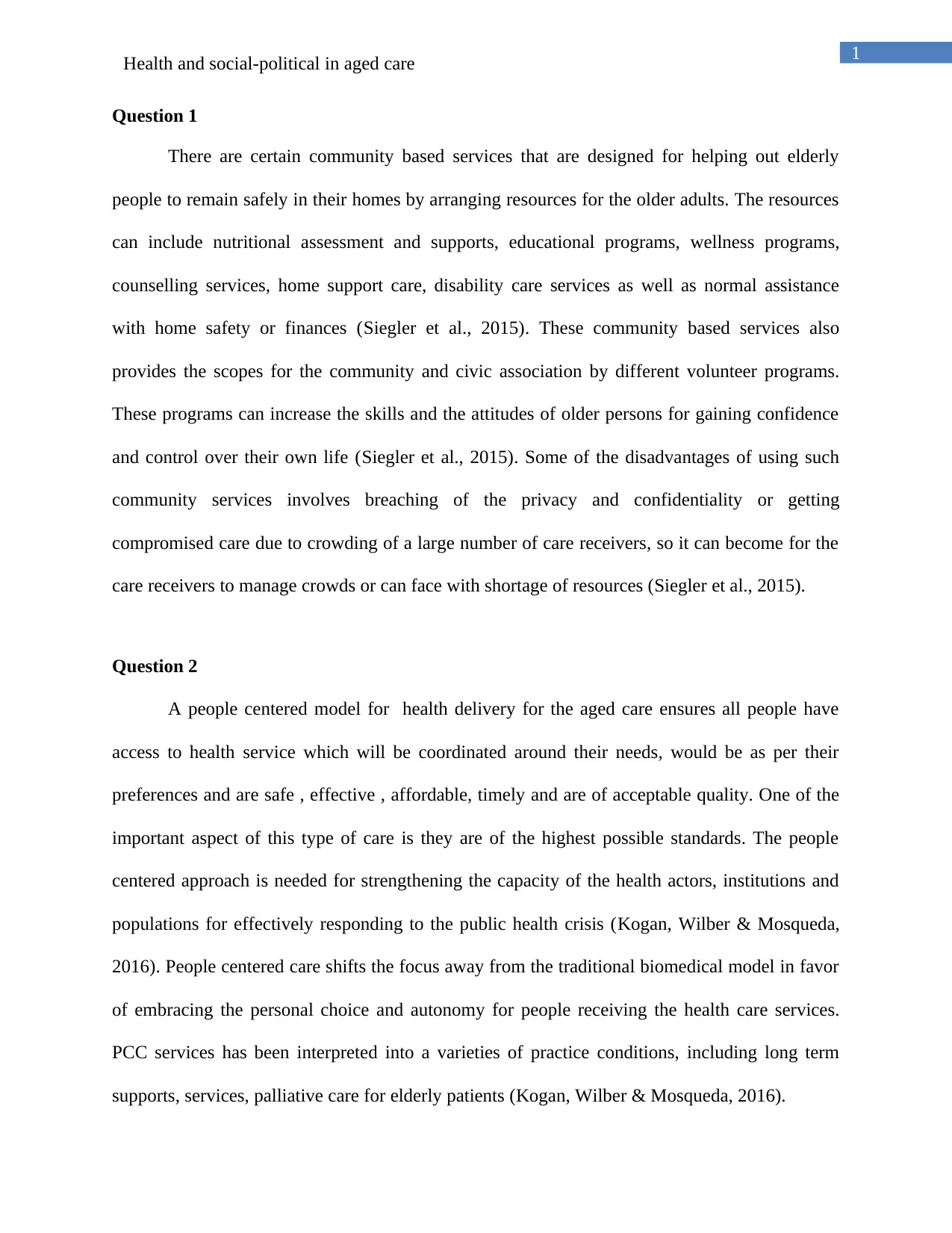
1
Health and social-political in aged care
Question 1
There are certain community based services that are designed for helping out elderly
people to remain safely in their homes by arranging resources for the older adults. The resources
can include nutritional assessment and supports, educational programs, wellness programs,
counselling services, home support care, disability care services as well as normal assistance
with home safety or finances (Siegler et al., 2015). These community based services also
provides the scopes for the community and civic association by different volunteer programs.
These programs can increase the skills and the attitudes of older persons for gaining confidence
and control over their own life (Siegler et al., 2015). Some of the disadvantages of using such
community services involves breaching of the privacy and confidentiality or getting
compromised care due to crowding of a large number of care receivers, so it can become for the
care receivers to manage crowds or can face with shortage of resources (Siegler et al., 2015).
Question 2
A people centered model for health delivery for the aged care ensures all people have
access to health service which will be coordinated around their needs, would be as per their
preferences and are safe , effective , affordable, timely and are of acceptable quality. One of the
important aspect of this type of care is they are of the highest possible standards. The people
centered approach is needed for strengthening the capacity of the health actors, institutions and
populations for effectively responding to the public health crisis (Kogan, Wilber & Mosqueda,
2016). People centered care shifts the focus away from the traditional biomedical model in favor
of embracing the personal choice and autonomy for people receiving the health care services.
PCC services has been interpreted into a varieties of practice conditions, including long term
supports, services, palliative care for elderly patients (Kogan, Wilber & Mosqueda, 2016).
Health and social-political in aged care
Question 1
There are certain community based services that are designed for helping out elderly
people to remain safely in their homes by arranging resources for the older adults. The resources
can include nutritional assessment and supports, educational programs, wellness programs,
counselling services, home support care, disability care services as well as normal assistance
with home safety or finances (Siegler et al., 2015). These community based services also
provides the scopes for the community and civic association by different volunteer programs.
These programs can increase the skills and the attitudes of older persons for gaining confidence
and control over their own life (Siegler et al., 2015). Some of the disadvantages of using such
community services involves breaching of the privacy and confidentiality or getting
compromised care due to crowding of a large number of care receivers, so it can become for the
care receivers to manage crowds or can face with shortage of resources (Siegler et al., 2015).
Question 2
A people centered model for health delivery for the aged care ensures all people have
access to health service which will be coordinated around their needs, would be as per their
preferences and are safe , effective , affordable, timely and are of acceptable quality. One of the
important aspect of this type of care is they are of the highest possible standards. The people
centered approach is needed for strengthening the capacity of the health actors, institutions and
populations for effectively responding to the public health crisis (Kogan, Wilber & Mosqueda,
2016). People centered care shifts the focus away from the traditional biomedical model in favor
of embracing the personal choice and autonomy for people receiving the health care services.
PCC services has been interpreted into a varieties of practice conditions, including long term
supports, services, palliative care for elderly patients (Kogan, Wilber & Mosqueda, 2016).
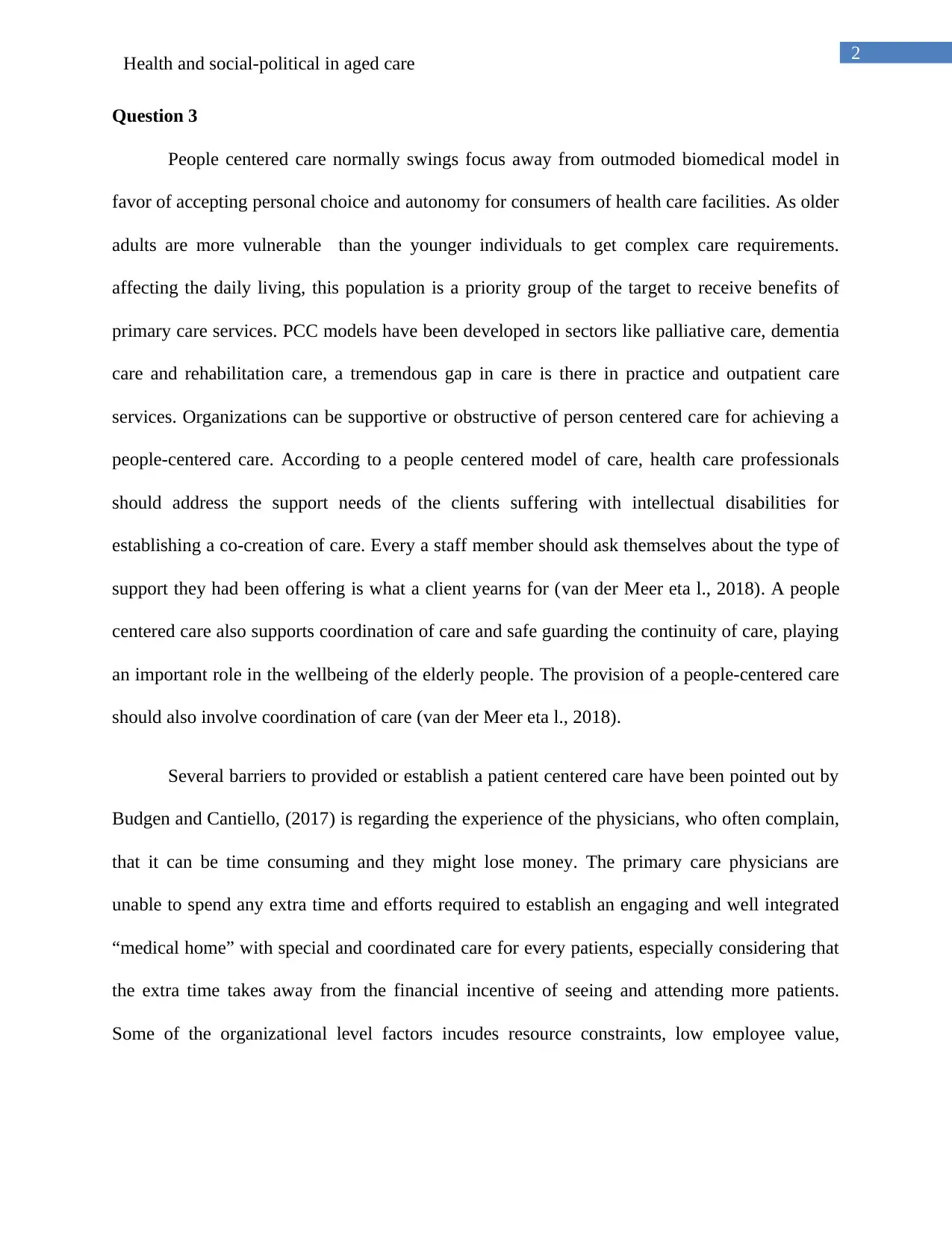
2
Health and social-political in aged care
Question 3
People centered care normally swings focus away from outmoded biomedical model in
favor of accepting personal choice and autonomy for consumers of health care facilities. As older
adults are more vulnerable than the younger individuals to get complex care requirements.
affecting the daily living, this population is a priority group of the target to receive benefits of
primary care services. PCC models have been developed in sectors like palliative care, dementia
care and rehabilitation care, a tremendous gap in care is there in practice and outpatient care
services. Organizations can be supportive or obstructive of person centered care for achieving a
people-centered care. According to a people centered model of care, health care professionals
should address the support needs of the clients suffering with intellectual disabilities for
establishing a co-creation of care. Every a staff member should ask themselves about the type of
support they had been offering is what a client yearns for (van der Meer eta l., 2018). A people
centered care also supports coordination of care and safe guarding the continuity of care, playing
an important role in the wellbeing of the elderly people. The provision of a people-centered care
should also involve coordination of care (van der Meer eta l., 2018).
Several barriers to provided or establish a patient centered care have been pointed out by
Budgen and Cantiello, (2017) is regarding the experience of the physicians, who often complain,
that it can be time consuming and they might lose money. The primary care physicians are
unable to spend any extra time and efforts required to establish an engaging and well integrated
“medical home” with special and coordinated care for every patients, especially considering that
the extra time takes away from the financial incentive of seeing and attending more patients.
Some of the organizational level factors incudes resource constraints, low employee value,
Health and social-political in aged care
Question 3
People centered care normally swings focus away from outmoded biomedical model in
favor of accepting personal choice and autonomy for consumers of health care facilities. As older
adults are more vulnerable than the younger individuals to get complex care requirements.
affecting the daily living, this population is a priority group of the target to receive benefits of
primary care services. PCC models have been developed in sectors like palliative care, dementia
care and rehabilitation care, a tremendous gap in care is there in practice and outpatient care
services. Organizations can be supportive or obstructive of person centered care for achieving a
people-centered care. According to a people centered model of care, health care professionals
should address the support needs of the clients suffering with intellectual disabilities for
establishing a co-creation of care. Every a staff member should ask themselves about the type of
support they had been offering is what a client yearns for (van der Meer eta l., 2018). A people
centered care also supports coordination of care and safe guarding the continuity of care, playing
an important role in the wellbeing of the elderly people. The provision of a people-centered care
should also involve coordination of care (van der Meer eta l., 2018).
Several barriers to provided or establish a patient centered care have been pointed out by
Budgen and Cantiello, (2017) is regarding the experience of the physicians, who often complain,
that it can be time consuming and they might lose money. The primary care physicians are
unable to spend any extra time and efforts required to establish an engaging and well integrated
“medical home” with special and coordinated care for every patients, especially considering that
the extra time takes away from the financial incentive of seeing and attending more patients.
Some of the organizational level factors incudes resource constraints, low employee value,
⊘ This is a preview!⊘
Do you want full access?
Subscribe today to unlock all pages.

Trusted by 1+ million students worldwide
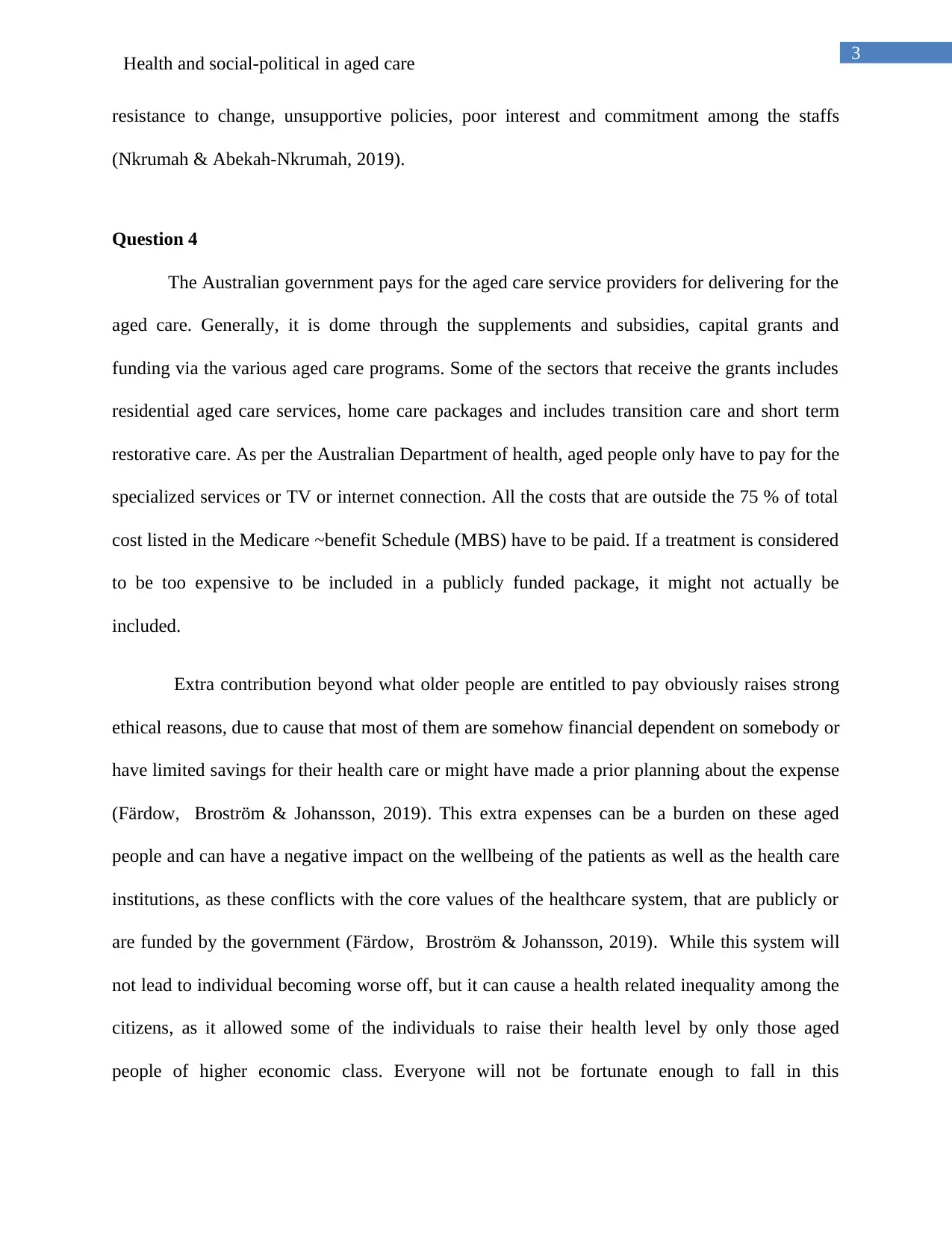
3
Health and social-political in aged care
resistance to change, unsupportive policies, poor interest and commitment among the staffs
(Nkrumah & Abekah-Nkrumah, 2019).
Question 4
The Australian government pays for the aged care service providers for delivering for the
aged care. Generally, it is dome through the supplements and subsidies, capital grants and
funding via the various aged care programs. Some of the sectors that receive the grants includes
residential aged care services, home care packages and includes transition care and short term
restorative care. As per the Australian Department of health, aged people only have to pay for the
specialized services or TV or internet connection. All the costs that are outside the 75 % of total
cost listed in the Medicare ~benefit Schedule (MBS) have to be paid. If a treatment is considered
to be too expensive to be included in a publicly funded package, it might not actually be
included.
Extra contribution beyond what older people are entitled to pay obviously raises strong
ethical reasons, due to cause that most of them are somehow financial dependent on somebody or
have limited savings for their health care or might have made a prior planning about the expense
(Färdow, Broström & Johansson, 2019). This extra expenses can be a burden on these aged
people and can have a negative impact on the wellbeing of the patients as well as the health care
institutions, as these conflicts with the core values of the healthcare system, that are publicly or
are funded by the government (Färdow, Broström & Johansson, 2019). While this system will
not lead to individual becoming worse off, but it can cause a health related inequality among the
citizens, as it allowed some of the individuals to raise their health level by only those aged
people of higher economic class. Everyone will not be fortunate enough to fall in this
Health and social-political in aged care
resistance to change, unsupportive policies, poor interest and commitment among the staffs
(Nkrumah & Abekah-Nkrumah, 2019).
Question 4
The Australian government pays for the aged care service providers for delivering for the
aged care. Generally, it is dome through the supplements and subsidies, capital grants and
funding via the various aged care programs. Some of the sectors that receive the grants includes
residential aged care services, home care packages and includes transition care and short term
restorative care. As per the Australian Department of health, aged people only have to pay for the
specialized services or TV or internet connection. All the costs that are outside the 75 % of total
cost listed in the Medicare ~benefit Schedule (MBS) have to be paid. If a treatment is considered
to be too expensive to be included in a publicly funded package, it might not actually be
included.
Extra contribution beyond what older people are entitled to pay obviously raises strong
ethical reasons, due to cause that most of them are somehow financial dependent on somebody or
have limited savings for their health care or might have made a prior planning about the expense
(Färdow, Broström & Johansson, 2019). This extra expenses can be a burden on these aged
people and can have a negative impact on the wellbeing of the patients as well as the health care
institutions, as these conflicts with the core values of the healthcare system, that are publicly or
are funded by the government (Färdow, Broström & Johansson, 2019). While this system will
not lead to individual becoming worse off, but it can cause a health related inequality among the
citizens, as it allowed some of the individuals to raise their health level by only those aged
people of higher economic class. Everyone will not be fortunate enough to fall in this
Paraphrase This Document
Need a fresh take? Get an instant paraphrase of this document with our AI Paraphraser
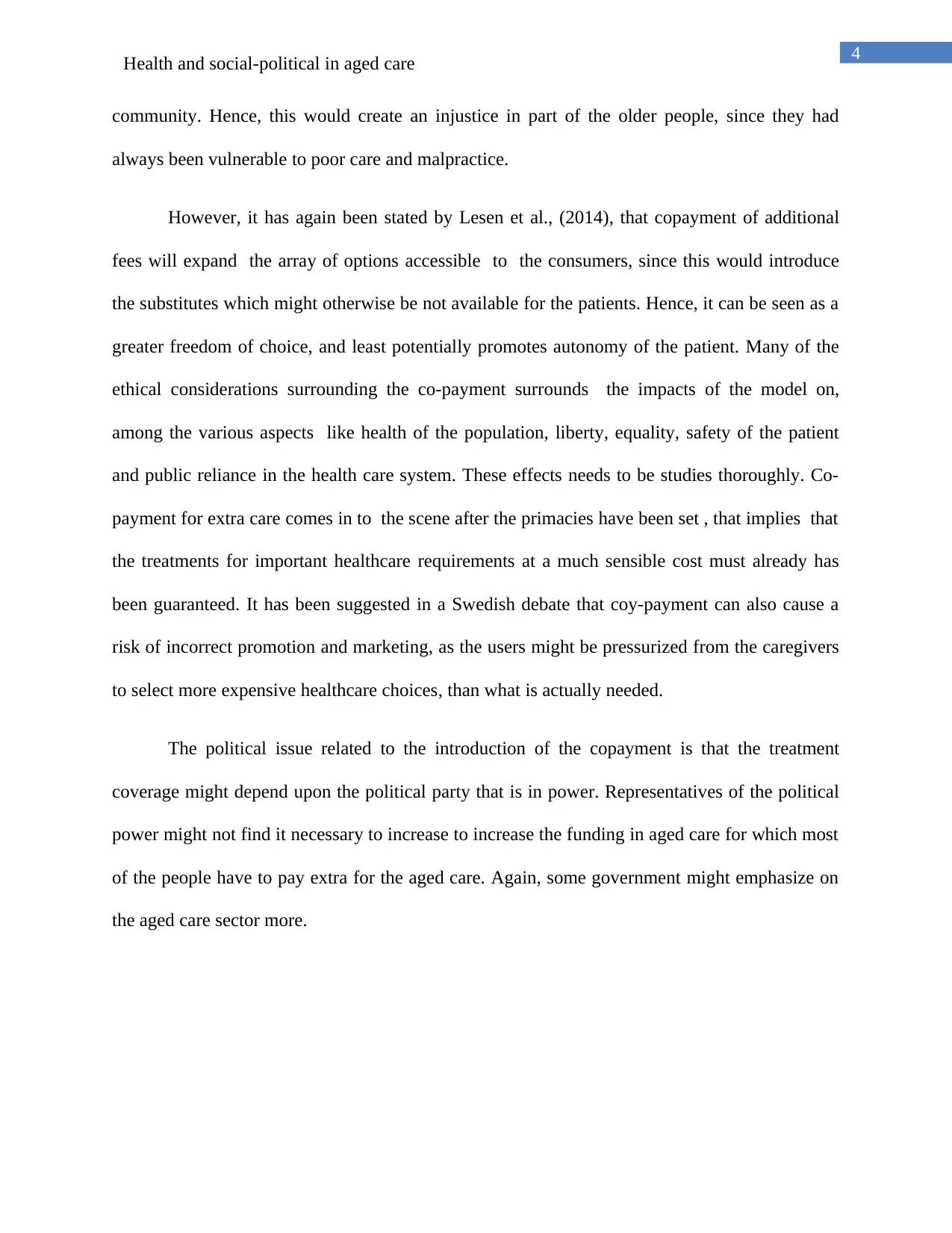
4
Health and social-political in aged care
community. Hence, this would create an injustice in part of the older people, since they had
always been vulnerable to poor care and malpractice.
However, it has again been stated by Lesen et al., (2014), that copayment of additional
fees will expand the array of options accessible to the consumers, since this would introduce
the substitutes which might otherwise be not available for the patients. Hence, it can be seen as a
greater freedom of choice, and least potentially promotes autonomy of the patient. Many of the
ethical considerations surrounding the co-payment surrounds the impacts of the model on,
among the various aspects like health of the population, liberty, equality, safety of the patient
and public reliance in the health care system. These effects needs to be studies thoroughly. Co-
payment for extra care comes in to the scene after the primacies have been set , that implies that
the treatments for important healthcare requirements at a much sensible cost must already has
been guaranteed. It has been suggested in a Swedish debate that coy-payment can also cause a
risk of incorrect promotion and marketing, as the users might be pressurized from the caregivers
to select more expensive healthcare choices, than what is actually needed.
The political issue related to the introduction of the copayment is that the treatment
coverage might depend upon the political party that is in power. Representatives of the political
power might not find it necessary to increase to increase the funding in aged care for which most
of the people have to pay extra for the aged care. Again, some government might emphasize on
the aged care sector more.
Health and social-political in aged care
community. Hence, this would create an injustice in part of the older people, since they had
always been vulnerable to poor care and malpractice.
However, it has again been stated by Lesen et al., (2014), that copayment of additional
fees will expand the array of options accessible to the consumers, since this would introduce
the substitutes which might otherwise be not available for the patients. Hence, it can be seen as a
greater freedom of choice, and least potentially promotes autonomy of the patient. Many of the
ethical considerations surrounding the co-payment surrounds the impacts of the model on,
among the various aspects like health of the population, liberty, equality, safety of the patient
and public reliance in the health care system. These effects needs to be studies thoroughly. Co-
payment for extra care comes in to the scene after the primacies have been set , that implies that
the treatments for important healthcare requirements at a much sensible cost must already has
been guaranteed. It has been suggested in a Swedish debate that coy-payment can also cause a
risk of incorrect promotion and marketing, as the users might be pressurized from the caregivers
to select more expensive healthcare choices, than what is actually needed.
The political issue related to the introduction of the copayment is that the treatment
coverage might depend upon the political party that is in power. Representatives of the political
power might not find it necessary to increase to increase the funding in aged care for which most
of the people have to pay extra for the aged care. Again, some government might emphasize on
the aged care sector more.
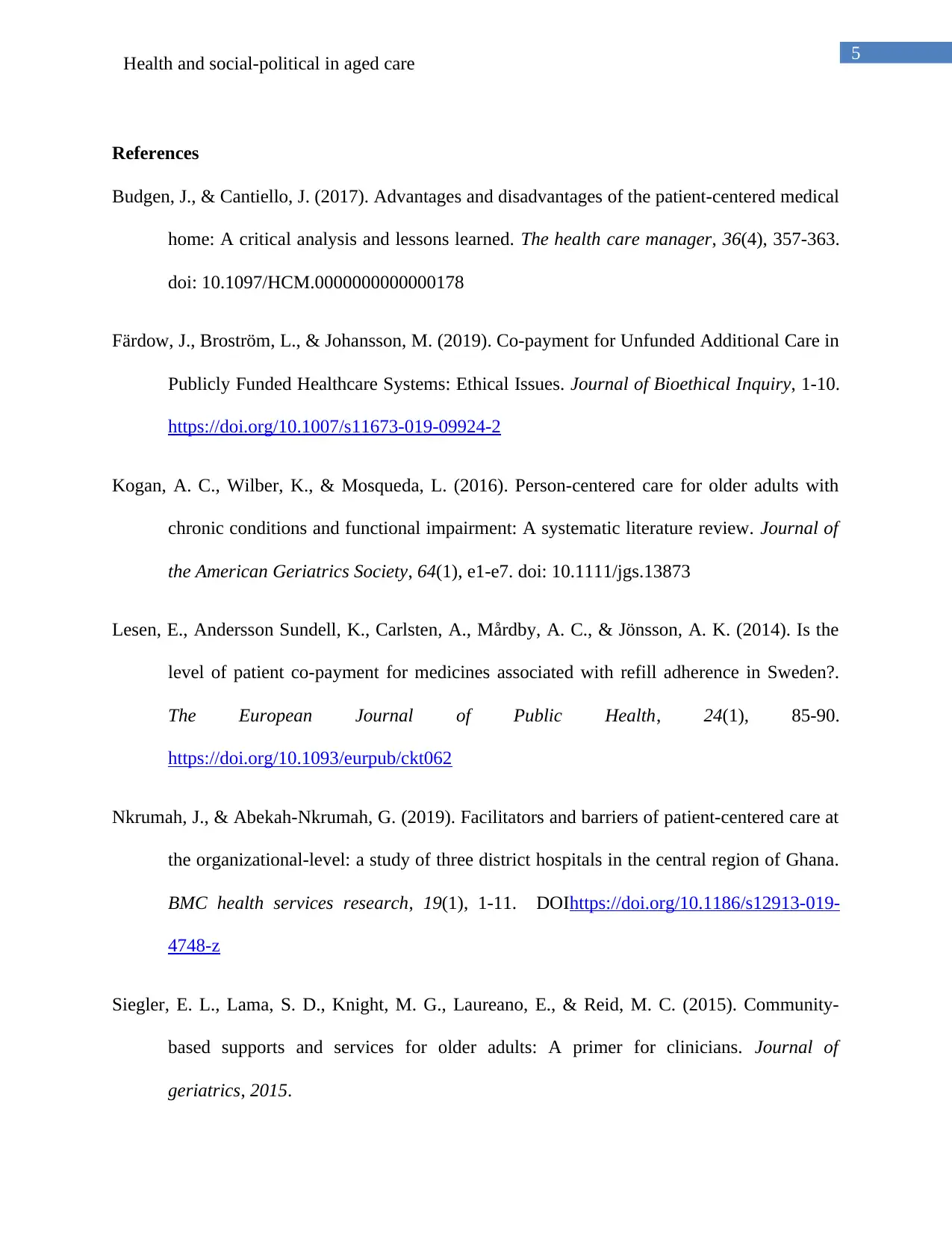
5
Health and social-political in aged care
References
Budgen, J., & Cantiello, J. (2017). Advantages and disadvantages of the patient-centered medical
home: A critical analysis and lessons learned. The health care manager, 36(4), 357-363.
doi: 10.1097/HCM.0000000000000178
Färdow, J., Broström, L., & Johansson, M. (2019). Co-payment for Unfunded Additional Care in
Publicly Funded Healthcare Systems: Ethical Issues. Journal of Bioethical Inquiry, 1-10.
https://doi.org/10.1007/s11673-019-09924-2
Kogan, A. C., Wilber, K., & Mosqueda, L. (2016). Person‐centered care for older adults with
chronic conditions and functional impairment: A systematic literature review. Journal of
the American Geriatrics Society, 64(1), e1-e7. doi: 10.1111/jgs.13873
Lesen, E., Andersson Sundell, K., Carlsten, A., Mårdby, A. C., & Jönsson, A. K. (2014). Is the
level of patient co-payment for medicines associated with refill adherence in Sweden?.
The European Journal of Public Health, 24(1), 85-90.
https://doi.org/10.1093/eurpub/ckt062
Nkrumah, J., & Abekah-Nkrumah, G. (2019). Facilitators and barriers of patient-centered care at
the organizational-level: a study of three district hospitals in the central region of Ghana.
BMC health services research, 19(1), 1-11. DOIhttps://doi.org/10.1186/s12913-019-
4748-z
Siegler, E. L., Lama, S. D., Knight, M. G., Laureano, E., & Reid, M. C. (2015). Community-
based supports and services for older adults: A primer for clinicians. Journal of
geriatrics, 2015.
Health and social-political in aged care
References
Budgen, J., & Cantiello, J. (2017). Advantages and disadvantages of the patient-centered medical
home: A critical analysis and lessons learned. The health care manager, 36(4), 357-363.
doi: 10.1097/HCM.0000000000000178
Färdow, J., Broström, L., & Johansson, M. (2019). Co-payment for Unfunded Additional Care in
Publicly Funded Healthcare Systems: Ethical Issues. Journal of Bioethical Inquiry, 1-10.
https://doi.org/10.1007/s11673-019-09924-2
Kogan, A. C., Wilber, K., & Mosqueda, L. (2016). Person‐centered care for older adults with
chronic conditions and functional impairment: A systematic literature review. Journal of
the American Geriatrics Society, 64(1), e1-e7. doi: 10.1111/jgs.13873
Lesen, E., Andersson Sundell, K., Carlsten, A., Mårdby, A. C., & Jönsson, A. K. (2014). Is the
level of patient co-payment for medicines associated with refill adherence in Sweden?.
The European Journal of Public Health, 24(1), 85-90.
https://doi.org/10.1093/eurpub/ckt062
Nkrumah, J., & Abekah-Nkrumah, G. (2019). Facilitators and barriers of patient-centered care at
the organizational-level: a study of three district hospitals in the central region of Ghana.
BMC health services research, 19(1), 1-11. DOIhttps://doi.org/10.1186/s12913-019-
4748-z
Siegler, E. L., Lama, S. D., Knight, M. G., Laureano, E., & Reid, M. C. (2015). Community-
based supports and services for older adults: A primer for clinicians. Journal of
geriatrics, 2015.
⊘ This is a preview!⊘
Do you want full access?
Subscribe today to unlock all pages.

Trusted by 1+ million students worldwide

6
Health and social-political in aged care
van der Meer, L., Nieboer, A. P., Finkenflügel, H., & Cramm, J. M. (2018). The importance of
person‐centred care and co‐creation of care for the well‐being and job satisfaction of
professionals working with people with intellectual disabilities. Scandinavian journal of
caring sciences, 32(1), 76-81. . doi: 10.1111/scs.12431.
Health and social-political in aged care
van der Meer, L., Nieboer, A. P., Finkenflügel, H., & Cramm, J. M. (2018). The importance of
person‐centred care and co‐creation of care for the well‐being and job satisfaction of
professionals working with people with intellectual disabilities. Scandinavian journal of
caring sciences, 32(1), 76-81. . doi: 10.1111/scs.12431.
1 out of 7
Related Documents
Your All-in-One AI-Powered Toolkit for Academic Success.
+13062052269
info@desklib.com
Available 24*7 on WhatsApp / Email
![[object Object]](/_next/static/media/star-bottom.7253800d.svg)
Unlock your academic potential
Copyright © 2020–2026 A2Z Services. All Rights Reserved. Developed and managed by ZUCOL.





